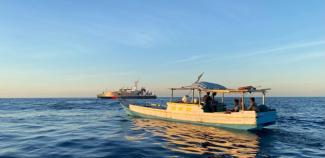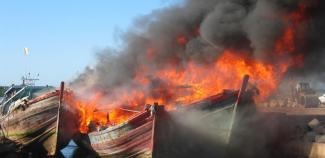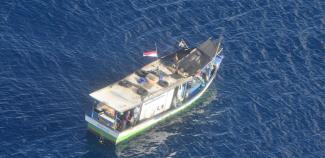


Indonesian - Bahasa Indonesian
Indonesian traditional fishers, using traditional fishing methods only, are permitted to operate in an area of about 50,000km2 of Australian waters in the Timor Sea, known as the MoU Box.
The MoU Box is managed in accordance with a bilateral agreement between the Australian and Indonesian Governments, promoting fisheries and marine cooperation between Australia and Indonesia.
Access is granted in recognition of the long history of traditional Indonesian fishing in the area and is limited to Indonesian fishers using traditional vessels without motors or engines, or any form of fishing using motors or engines.
All Indonesian fishers must follow Australian laws when accessing the MoU Box.
Fishing within the MoU Box is regulated by the Australian Fisheries Management Authority. Harsh penalties apply to those fishers who do not comply with the rules.
Indonesian fishers must follow the rules and respect the Australian Marine Park zones within the MoU Box.
Australian authorities monitor the MoU Box and all Indonesian visitors must cooperate with Australian authorities.
If you do not comply, your boat, gear and catch may be seized and you may be detained and face prosecution in Australia.
Indonesian fishers who break the rules risk having their boat, fishing equipment and catch seized and destroyed.
Indonesian fishers can also be prosecuted and fined heavily or sent to jail.
Australian authorities have zero tolerance for illegal fishing activities by people seeking to exploit Australia’s marine resources.
The Australian Maritime Border Command, comprising a joint taskforce of Australian Border Force, Royal Australian Navy and the Australian Fisheries Management Authority, patrol the MoU Box and Australian waters with aerial and marine surveillance activities.
The MoU Box is located within the Australian Fishing Zone and the continental shelf adjacent to Ashmore Reef, Cartier Island, Scott Reef, Seringapatam Reef and Browse Island.
Approximately 200 nautical miles north of Broome, Australia and approximately 60 nautical miles south of the Island of Rote, Indonesia.
For detailed coordinates refer to Australian Fisheries Enforcement Arrangements in the Timor and Arafura Seas.

Indonesian fishers are permitted to fish within the MoU Box using traditional fishing methods only. Indonesian fishers must not fish using methods or vessels using motors or engines.

Indonesian fishers cannot use fishing methods or vessels assisted by motors or engines anywhere within the fishing zone.
Indonesian fishers must not use
- motorised, powered boats
- air compressors or compressed air breathing equipment
- any other fishing method using motors or engines

Indonesian fishers must not
- catch or kill any turtles or birds anywhere,
- collect any turtle or bird eggs anywhere,
- go ashore on land unless permitted or it is an emergency, e.g., during bad weather,
- enter Australian Marine Park Sanctuary Zone (pink zone) except in an emergency - all fish and gear must be stowed and secured

Traditional fishing by Indonesian fishers within the MOU box is restricted to traditional boats and fishing methods which do not use motors or engines.
Traditional fishing methods include line fishing or free-diving for hand collection of sedentary species without the use of compressed air breathing equipment or any other fishing equipment with motors or engines.
Australian Marine Parks are an area of sea (which may include land, the seabed and subsoil under the sea) established by law for the protection and maintenance of biological diversity and of natural and cultural resources.
Marine Park Zones and rules for activities in marine parks help to achieve a positive outcome for the environment by protecting important marine habitats and support sustainable fishing.
Specific rules apply for the Ashmore Reef Marine Park and Cartier Island Marine Park zones which are both within the MoU Box.
Sanctuary Zone (pink)
Indonesian fishers may only access a sanctuary zone (pink zone) if it is an emergency, e.g., during dangerous weather.
All fish and fishing gear must be kept stowed and secured when in these zones.
Recreational use zone (orange)
Indonesian fishers may access a recreational use zone for the following reasons only:
- shelter at designated moorings;
- go ashore for freshwater and visit grave sites; and/or.
- fish for subsistence purposes only.


![]()
Australia-Indonesia cooperation
In 1974, the Government of Indonesia and the Government of Australia entered into an agreement providing Indonesians to access an area within Australian waters for the purpose of traditional fishing.
The area of waters referred to as the MoU Box is officially known as the Australia-Indonesia Memorandum of Understanding regarding the Operations of Indonesian Traditional Fishermen in Areas of the Australian Fishing Zone and Continental Shelf – 1974.
Indonesian fishers from Rote and Kupang in the Indonesia province of East Nusa Tenggara have traditionally fished for sedentary reef species using sail boats in this area of Australian waters. Stocks of trepang, trochus and some finfish in the MoU Box are sensitive to high volumes of fishing pressure which can result in some species being considered overfished. Limiting fishing effort is a key management strategy to ensure the sustainability of these stocks.
Australia limits access to its waters within the MoU Box enabling Indonesian traditional fishers to continue their customary practices and target species such as finfish, shark, trepang, trochus, abalone and sponges. This access is granted in recognition of the long history of traditional Indonesian fishing in the area and is subject to fishers operating within the rules.
Indonesia and Australia have collaboratively produced practical guidelines for Indonesian traditional fishers operating in the MoU box. Under the guidelines Australia provides access for Indonesian fishers who operate in accordance with the arrangements, and Indonesia inform traditional fishers of their responsibilities and discourage action which could result in breaches of the arrangements.
Both Australia and Indonesia share information concerning the activities of the traditional Indonesian fishers operating in the area west of the Timor Sea and support arrangements for control of activity in the MOU box to preserve the interests of Indonesian traditional fishers.
Australian Fisheries Enforcement Chart
Download the Australian Fisheries Enforcement Arrangements in the Timor and Arafura Seas.
Report illegal fishing
Illegal fishing threatens the sustainability and future of the legal fishing industry and the fragile ecosystem of the marine environment.
You can help us make sure fish stocks are protected for the future by reporting any illegal and suspicious fishing activities you see!
If you see something suspicious – or something that just does not feel right – report it.
CRIMFISH – reports of fisheries crime
- 24 hour CRIMFISH hotline 1800 274 634
- email intelligence@afma.gov.au
- submit an online form
Australian Border Watch
- Overseas or satellite phone +61 2 6246 1325
- Within Australia 1800 009 623
All information provided is treated confidentially. If English is not your preferred language, we can arrange an interpreter to help you.